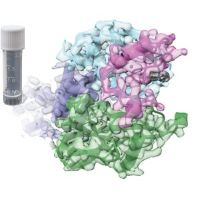Specification
| Organism | Homo sapiens (Human) |
| Expression Host | E.Coli |
| Tag Info | Tag-Free |
| Purity | >98% as determined by SDS-PAGE and HPLC. |
| Uniprot ID | P58294 |
| Uniprot Entry Name | PROK1_HUMAN |
| Gene Names | PROK1,UNQ600/PRO1186 |
| Alternative Names | Endocrine-gland-derived vascular endothelial growth factor, Mambakine |
| Expression Region | Full Length of Mature Protein (20-105aa) |
| Molecular Weight | 9.7 kDa |
| Endotoxin | Less than 1.0 EU/µg as determined by LAL method. |
| Sequence | AVITGACERD VQCGAGTCCA ISLWLRGLRM CTPLGREGEE CHPGSHKVPF FRKRKHHTCP CLPNLLCSRF PDGRYRCSMD LKNINF |
| Product Form | Lyophilized powder (Lyophilized from a 0.2 µm filtered PBS, pH 7.4, 0.02 % Tween-20) |
| Reconstitution | Please reconstitute protein in deionized sterile water and we recommend that briefly centrifuge thevial prior to opening the vial .We recommend aliquot for long-term storage at -20℃/-80℃. |
Background
| Relevance | Potently contracts gastrointestinal (GI) smooth muscle. Induces proliferation, migration and fenestration (the formation of membrane discontinuities) in capillary endothelial cells derived from endocrine glands. Has little or no effect on a variety of other endothelial and non-endothelial cell types. Induces proliferation and differentiation, but not migration, of enteric neural crest cells. Directly influences neuroblastoma progression by promoting the proliferation and migration of neuroblastoma cells. Positively regulates PTGS2 expression and prostaglandin synthesis. May play a role in placentation. May play a role in normal and pathological testis angiogenesis. {ECO:0000269|PubMed:11259612, ECO:0000269|PubMed:11528470, ECO:0000269|PubMed:15292351, ECO:0000269|PubMed:17289879, ECO:0000269|PubMed:18339712}. |
| Function | Potently contracts gastrointestinal (GI) smooth muscle. Induces proliferation, migration and fenestration (the formation of membrane discontinuities) in capillary endothelial cells derived from endocrine glands. Has little or no effect on a variety of other endothelial and non-endothelial cell types. Induces proliferation and differentiation, but not migration, of enteric neural crest cells. Directly influences neuroblastoma progression by promoting the proliferation and migration of neuroblastoma cells. Positively regulates PTGS2 expression and prostaglandin synthesis. May play a role in placentation. May play a role in normal and pathological testis angiogenesis. |
| Involvement in disease | |
| Subcellular Location | Secreted |
| Protein Families | AVIT (prokineticin) family |
| Tissue Specificity | Localizes to glandular epithelium, stroma and vascular epithelial cells of first trimester decidua (at protein level). Up-regulated in first trimester decidua when compared with non-pregnant endometrium. Expressed in the steroidogenic glands, ovary, testis, adrenal and placenta. |
| Pathway |
QC Data
| Note | Please contact us for QC Data |
| Product Image (Reference Only) |  |

